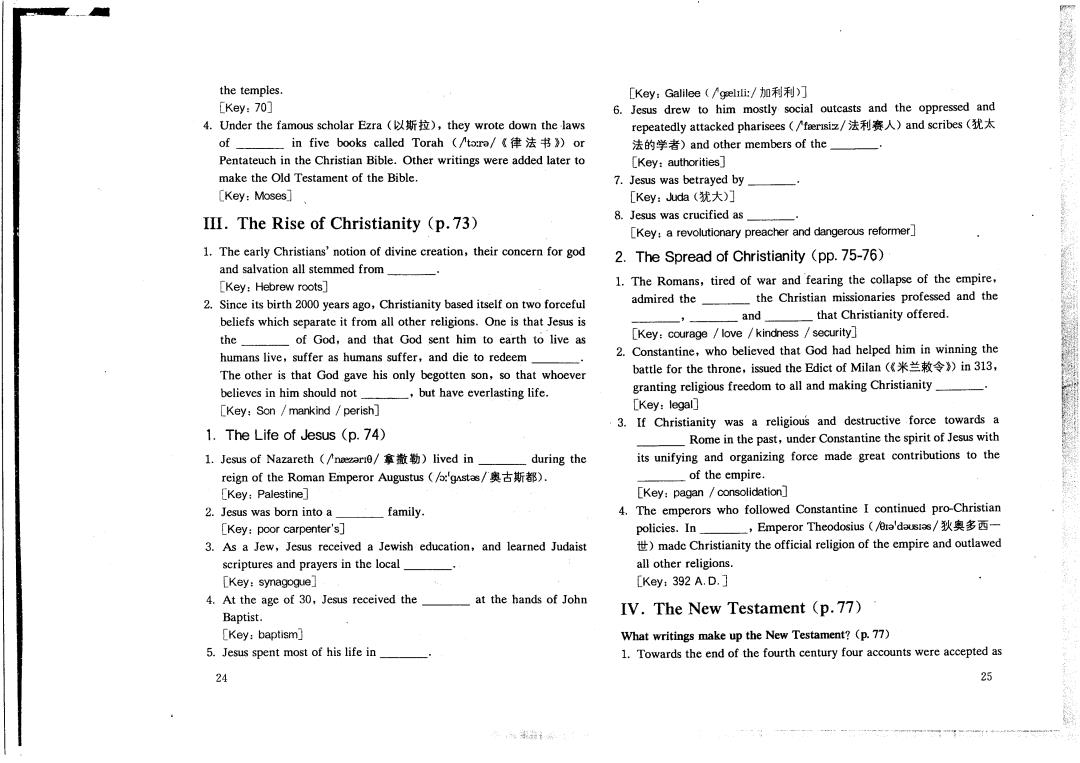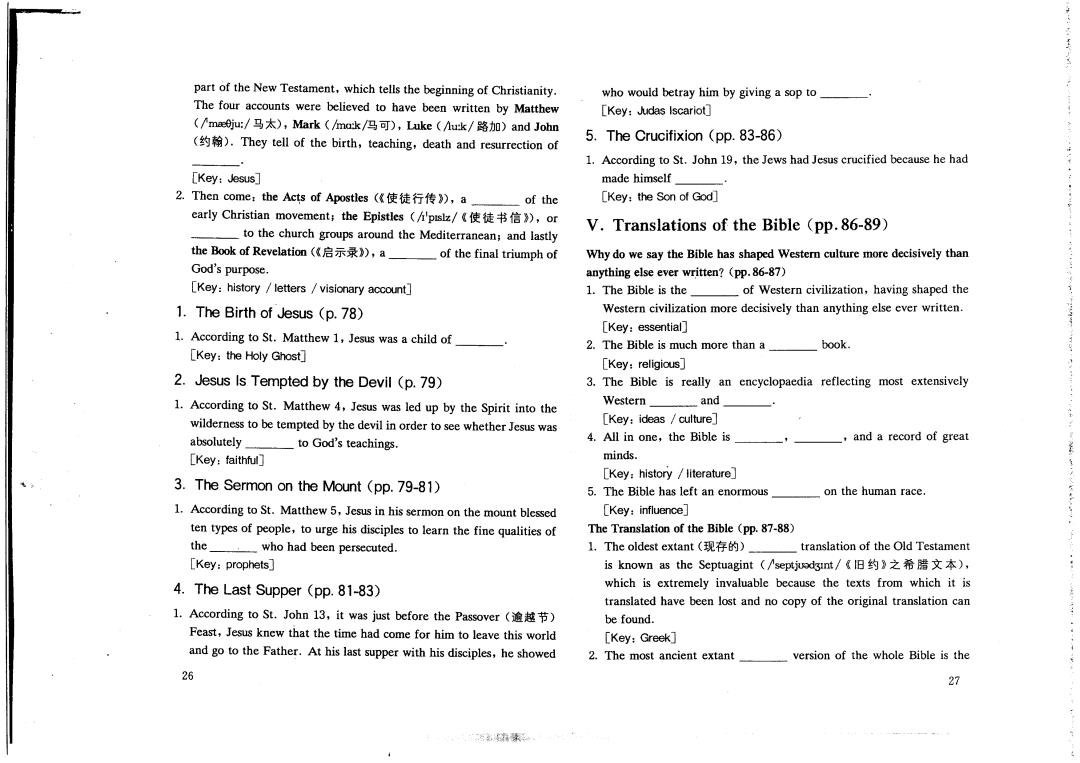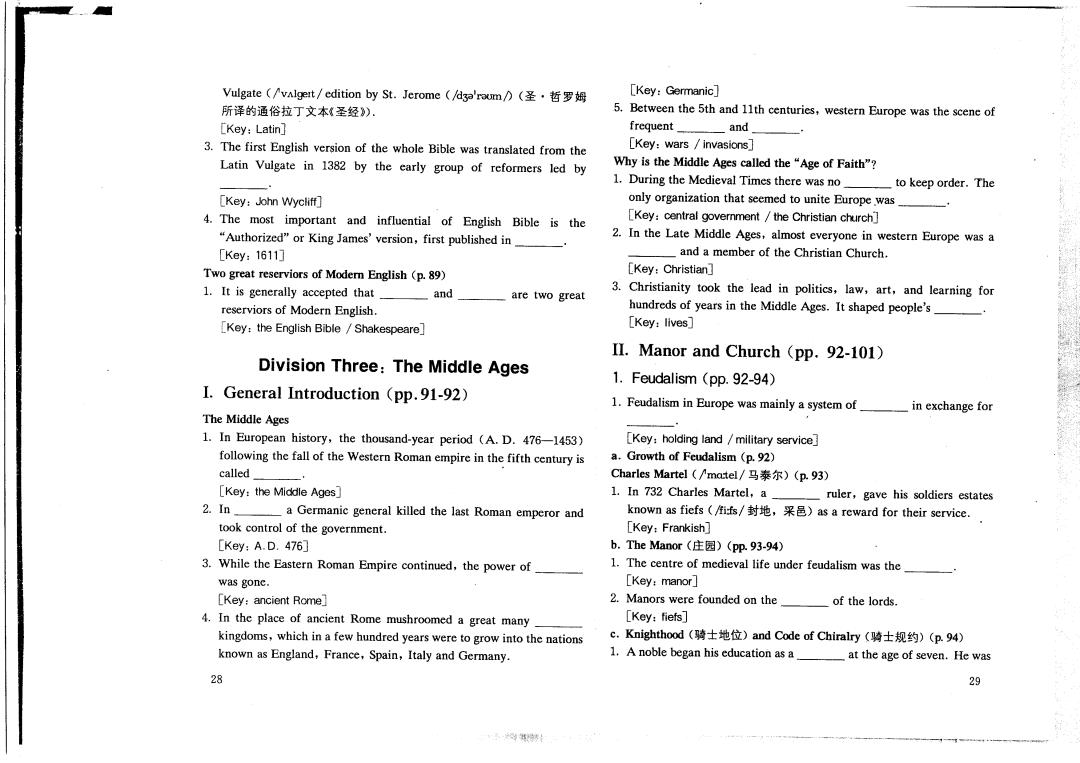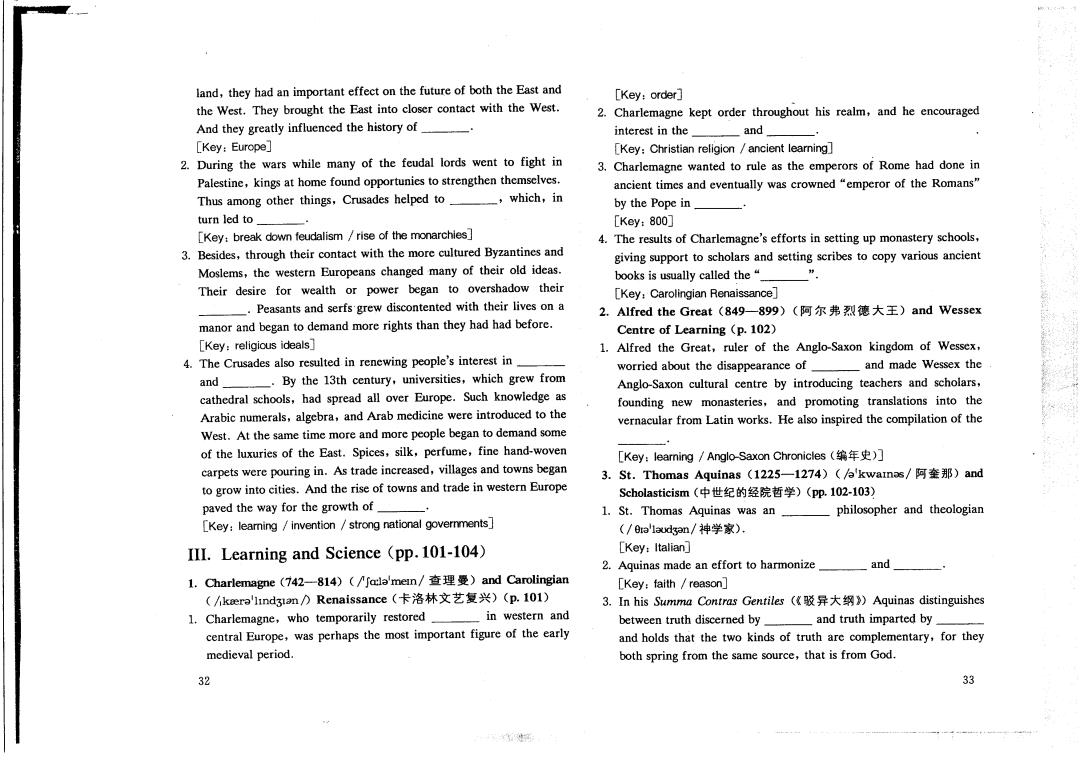
the temples. [Key:Galilee(/geli:/加利利)门 [Key:70] 6.Jesus drew to him mostly social outcasts and the oppressed and 4.Under the famous scholar Ezra(以斯拉),they wrote down the laws repeatedly attacked pharisees(faerisiz/法利赛人)and scribes(犹太 of_in five books called Torah(tbrm/《律法书》)or 法的学者)and other members of the Pentateuch in the Christian Bible.Other writings were added later to [Key:authorities] make the Old Testament of the Bible. 7.Jesus was betrayed by [Key:Moses] [Key:uda(犹大)] 8.Jesus was crucified as III.The Rise of Christianity (p.73) [Key:a revolutionary preacher and dangerous reformer] 1.The early Christians'notion of divine creation,their concern for god 2.The Spread of Christianity (pp.75-76) and salvation all stemmed from [Key:Hebrew roots] 1.The Romans,tired of war and fearing the collapse of the empire, 2.Since its birth 2000 years ago,Christianity based itself on two forceful admired the the Christian missionaries professed and the beliefs which separate it from all other religions.One is that Jesus is _,andthat Christianity offered. the of God,and that God sent him to earth to live as [Key:courage love kindness /security] humans live,suffer as humans suffer,and die to redeem 2.Constantine,who believed that God had helped him in winning the The other is that God gave his only begotten son,so that whoever battle for the throne,.issued the Edict of Milan(《米兰敕令》)in3l3, believes in him should not,but have everlasting life granting religious freedom to all and making Christianity [Key:Son mankind perish] [Key:legal 3.If Christianity was a religious and destructive force towards a 1.The Life of Jesus (p.74) Rome in the past,under Constantine the spirit of Jesus with 1.Jesus of Nazareth(noezar/拿撤勒)lived in. during the its unifying and organizing force made great contributions to the reign of the Roman Emperor Augustus(:'gAstas/奥古斯都). of the empire. [Key:Palestine] [Key:pagan /consolidation] 2.Jesus was born into a family 4.The emperors who followed Constantine I continued pro-Christian [Key:poor carpenter's] policies.In一,Emperor Theodosius(/Ara'dausias/狄奥多西- 3.As a Jew,Jesus received a Jewish education,and learned Judaist made Christianity the official religion of the empire and outlawed scriptures and prayers in the local all other religions. [Key:symagogue] [Key:392A.D.] 4.At the age of 30,Jesus received the at the hands of John Baptist. IV.The New Testament (p.77) [Key:baptism] What writings make up the New Testament?(p.77) 5.Jesus spent most of his life in 1.Towards the end of the fourth century four accounts were accepted as 24 25

part of the New Testament,which tells the beginning of Christianity. who would betray him by giving a sop to The four accounts were believed to have been written by Matthew [Key:Judas Iscariot] (maeu:/马太),Mark(mak/冯可),Luke(uk/路加)and John ()They tell of the birth,teaching,death and resurrection of 5.The Crucifixion (pp.83-86) 1.According to St.John 19,the Jews had Jesus crucified because he had [Key:Jesus] made himself 2.Then come,the Acts of Apostles(《使徒行传》),a of the [Key:the Son of God] early Christian movement;the Epistles('pslz/《使徒书信》),or _to the church groups around the Mediterranean;and lastly V.Translations of the Bible (pp.86-89) the Book of Revelation(《启示录),a of the final triumph of Why do we say the Bible has shaped Wester culture more decisively than God's purpose. anything else ever written?(pp.86-87) [Key:history /letters /visionary account] 1.The Bible is the of Western civilization,having shaped the 1.The Birth of Jesus (p.78) Western civilization more decisively than anything else ever written. [Key:essential] 1.According to St.Matthew 1,Jesus was a child of 2.The Bible is much more than a book. [Key:the Holy Ghost] [Key:religious] 2.Jesus Is Tempted by the Devil (p.79) 3.The Bible is really an encyclopaedia reflecting most extensively 1.According to St.Matthew 4,Jesus was led up by the Spirit into the Western _and wilderness to be tempted by the devil in order to see whether Jesus was [Key:ideas /culture] absolutely to God's teachings. 4.All in one,the Bible is and a record of great [Key:faithful] minds. [Key:history /literature] 3.The Sermon on the Mount (pp.79-81) 5.The Bible has left an enormous on the human race. 1.According to St.Matthew 5,Jesus in his sermon on the mount blessed [Key:influence] ten types of people,to urge his disciples to learn the fine qualities of The Translation of the Bible (pp.87-88) the who had been persecuted. l.The oldest extant(现存的)__translation of the Old Testament [Key:prophets] is known as the Septuagint(septjuxdgit/《旧约》之希腊文本), 4.The Last Supper (pp.81-83) which is extremely invaluable because the texts from which it is translated have been lost and no copy of the original translation can l.According to St.John 13,it was just before the Passover(逾越节) be found. Feast,Jesus knew that the time had come for him to leave this world [Key:Greek] and go to the Father.At his last supper with his disciples,he showed 2.The most ancient extant version of the whole Bible is the 26 27 容有来

Vulgate(vAlgert/edition by St.Jerome(a3'ramD(圣·哲罗姆 [Key:Germanic] 所译的通俗拉丁文本《圣经》). 5.Between the 5th and 11th centuries,western Europe was the scene of [Key:Latin] frequent and 3.The first English version of the whole Bible was translated from the [Key:wars invasions] Latin Vulgate in 1382 by the early group of reformers led by Why is the Middle Ages called the"Age of Faith"? 1.During the Medieval Times there was no to keep order.The [Key:John Wycliff] only organization that seemed to unite Europe was 4.The most important and influential of English Bible is the [Key:central government the Christian church] "Authorized"or King James'version,first published in 2.In the Late Middle Ages,almost everyone in western Europe was a [Key:1611] and a member of the Christian Church. Two great reserviors of Moder English (p.89) [Key:Christian] 1.It is generally accepted that and are two great 3.Christianity took the lead in politics,law,art,and learning for reserviors of Modern English. hundreds of years in the Middle Ages.It shaped people's [Key:the English Bible Shakespeare] [Key:lives] II.Manor and Church (pp.92-101) Division Three:The Middle Ages 1.Feudalism (pp.92-94) I.General Introduction (pp.91-92) 1.Feudalism in Europe was mainly a system of in exchange for The Middle Ages 1.In European history,the thousand-year period (A.D.476-1453) [Key:holding land /military service] following the fall of the Western Roman empire in the fifth century is a.Growth of Feudalism (p.92) called Charles Martel(matel./马泰尔)(p.93) [Key:the Middle Ages] 1.In 732 Charles Martel,a ruler,gave his soldiers estates 2.n a Germanic general killed the last Roman emperor and known as fiefs(its/封地,采邑)as a reward for their service.. took control of the government. [Key:Frankish] [Key:A.D.476] b.The Manor(庄园)(pp.93-94) 3.While the Eastern Roman Empire continued,the power of 1.The centre of medieval life under feudalism was the was gonc. [Key:manor] [Key:ancient Rome] 2.Manors were founded on the of the lords. 4.In the place of ancient Rome mushroomed a great many [Key:fiefs] kingdoms,which in a few hundred years were to grow into the nations c.Knighthood(骑士地位)and Code of Chiralry(骑士规约)(p.94) known as England,France,Spain,Italy and Germany 1.A noble began his education as a at the age of seven.He was 28 29

taught to say his prayers,learned good manners and ran errands for A.D.many men withdrew from worldly contacts to deserts and lonely the ladics.At about fourteen,the page became a.He was places.This movement developed into the establishment of taught the duties of a knight and practised using a sword,lance and and for monks and nuns shield.He went into battle with his master.If the squire proved to be [Key:monasteries /convents] a good fighter,he would be made a at a special ceremony 2.Some of the hermits were great scholars known as"",whose known as work is generally considered orthodox. [Key:page(小侍从)/squire(感从)/knight(骑士)/dubbing(以剑 [Key:Father of the Church] 拍肩封为骑士)] c.The Power and Influence of the Catholic Church (p.98) 2.As a knight,he was pledged to protect the weak,to fight for the 1.The medieval Church was the in the country and town alike, church,to be loyal to his lord and to respect women of noble birth. and it had a part in all important events. These rules were known as. from which the Western idea of [Key:centre of daily life] good manners developed. The three classes of people under feudalism in Westemn Europe (p.98) [Key:code of chivalry] 1.Under feudalism,people of Western Europe were mainly divided into 2.The.Church (p.95) threc classes:,and 1.Christianity had spread throughout the Roman world and the Church [Key:clergy lords peasants] had set up its own government by the time thefell. The difference between a serf and a free man (p.93) [Key:Western Roman Empire] 1.A serf was a who,after giving his land and freedom to a 2.After 1054,the Church was divided into and the Eastern lord,was bound to the land where he was born.A free man was Orthodox Church. usually a who made ploughs,shod horses and made harnesses for oxen and horses. [Key:the Roman Catholic Church] 3.In order to develop a civilization based on Christianity,the Catholic [Key:peasant /worker] Church made the official language and helped to preserve 3.The Crusades(十字军东征)(pp.99-101) and pass on the heritage of the Roman Empire. 1.In 1071 Palestine fell to the armies of the Turkish Moslems who [Key:Latin] attacked the Christian pilgrims to Jerusalem,killing many of them a.The Organization of Church (pp.95-96) and sold many others as slaves.News of this kind roused great l.The word“catholic'"meant“ ” indignation among Christians in Western Europe.The result was a [Key:universal] series of called Crusades which went on for about 200 years. 2.The Catholic Church was a [Key:holy wars] [Key:highly centralized and disciplined international organization] What important effect did the Crusades have on the future of both the East b.Church Fathers and Early Monasticism (p.96) and the West? 1.Heeding the spiritual message of Christianity,between 300 and 500 1.Although the Crusades did not achieve their goal to regain the Holy 30 31 我霸

land,they had an important effect on the future of both the East and [Key:order] the West.They brought the East into closer contact with the West. 2.Charlemagne kept order throughout his realm,and he encouraged And they greatly influenced the history of interest in the and [Key:Europe] [Key:Christian religion /ancient learning] 2.During the wars while many of the feudal lords went to fight in 3.Charlemagne wanted to rule as the emperors of Rome had done in Palestine,kings at home found opportunies to strengthen themselves. ancient times and eventually was crowned "emperor of the Romans" Thus among other things,Crusades helped to,which,in by the Pope in_· turn led to [Key:800] [Key:break down feudalism /rise of the monarchies] 4.The results of Charlemagne's efforts in setting up monastery schools, 3.Besides,through their contact with the more cultured Byzantines and giving support to scholars and setting scribes to copy various ancient Moslems,the western Europeans changed many of their old ideas. books is usually called the Their desire for wealth or power began to overshadow their [Key:Carolingian Renaissance] Peasants and serfs'grew discontented with their lives on a 2.Alfred the Great(849一899)(阿尔弗烈德大王)and Wessex manor and began to demand more rights than they hadhad before. Centre of Learning (p.102) [Key:religious ideals] 1.Alfred the Great,ruler of the Anglo-Saxon kingdom of Wessex, 4.The Crusades also resulted in renewing people's interest in worried about the disappearance of and made Wessex the and.By the 13th century,universities,which grew from Anglo-Saxon cultural centre by introducing teachers and scholars, cathedral schools,had spread all over Europe.Such knowledge as founding new monasteries,and promoting translations into the Arabic numerals,algebra,and Arab medicine were introduced to the vernacular from Latin works.He also inspired the compilation of the West.At the same time more and more people began to demand some of the luxuries of the East.Spices,silk,perfume,fine hand-woven [Key:leamning/Anglo-Saxon Chronicles(编年史)] carpets were pouring in.As trade increased,villages and towns began 3.St.Thomas Aquinas(1225-1274)('kwainos/阿奎那)and to grow into cities.And the rise of towns and trade in western Europe Scholasticism(中世纪的经院哲学)(pp.102-103) paved the way for the growth of 1.St.Thomas Aquinas was an philosopher and theologian [Key:leaming invention /strong national governments] (/0ra1dan/神学家). III.Learning and Science (pp.101-104) [Key:Italian] 2.Aquinas made an effort to harmonize and l.Charlemagne(742-一814)(jaia'men/查理曼)and Carolingian [Key:faith reason] (/kers'lnd3 an/Renaissance(卡洛林文艺复兴)(p.101) 3.In his Summa Contras Gentiles(《驳异大纲》)Aquinas distinguishes 1.Charlemagne,who temporarily restored in western and between truth discerned by and truth imparted by central Europe,was perhaps the most important figure of the early and holds that the two kinds of truth are complementary,for they medieval period. both spring from the same source,that is from God. 32 33 字